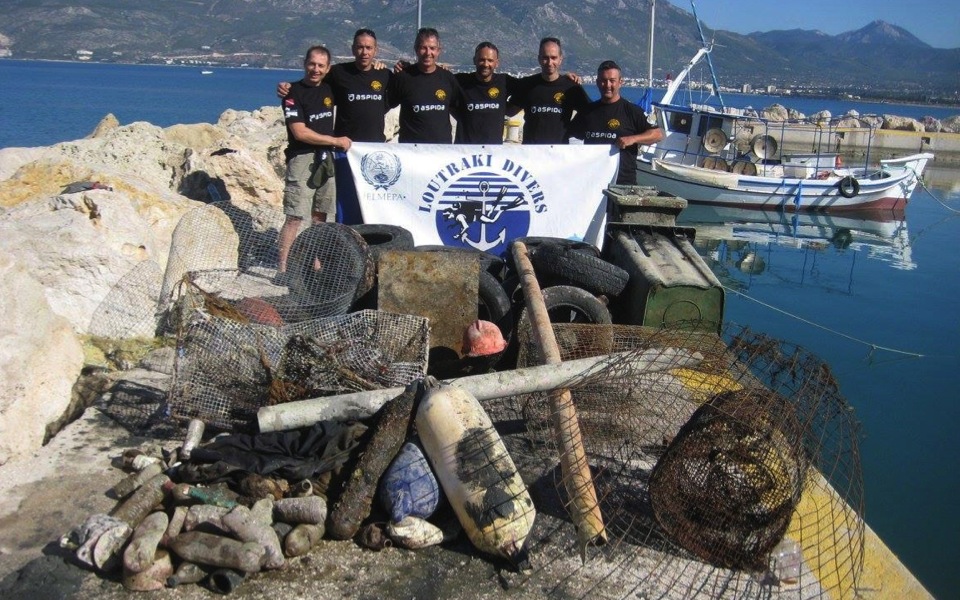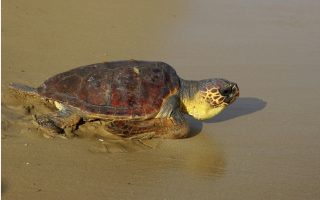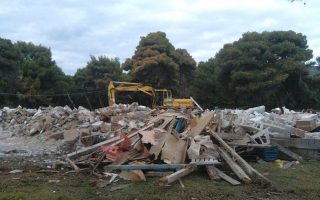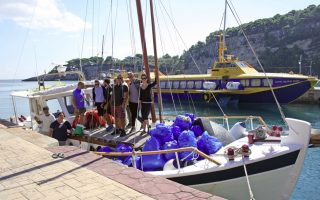Volunteer divers make clean seas their business

“Imagine your backyard covered in trash. Wouldn’t you feel the need to clean it up?” asks Chrysanthos Chorbas, explaining how the Loutraki Divers group, headquartered at the seaside resort on the Gulf of Corinth, came to volunteer to clean the seabed of debris and trash that has built up over the years. “Those of us who dive regard the sea as our world and of course we like to see it clean.”
The initiative, carried out in cooperation with local port authorities, started in the summer of 2013 and so far has conducted 65 operations in places ranging from Corinth, to Varkiza beach in southeastern Athens, and the islands of Spetses, Poros and Hydra. Each operation requires six divers and two shore assistants and in the last three years the volunteers have removed more than 12 tons of trash from the bottom of the sea.
“Our goal as a team is to offer a solution and the result is now quantifiable,” says the head of the group.
The team conducted its biggest operation yet just a few months ago in the port of Hydra, a popular holiday island just a short ferry ride from Athens. In more than 30 diving hours over the course of three days, the team removed 5 tons of trash. “Another 30 tons remains,” says Chorbas, explaining that busy ports tend to get the highest accumulation of debris as constant activity from ferries and yachts prevents systematic cleanups.
“When the [Hydra] municipal authority heard about what we do, it got in touch and asked if we could take a stab at the port,” says Chorbas.
The 5 tons of trash the team dredged up included 72 truck and car tires, 32 boat batteries and thousands of plastic bottles, cups and plates, as well as a vacuum cleaner. The presence of tires on the car-free island, says Chorbas, is explained by the fact that they are used to protect boats’ hulls when they dock.
“Wherever there are humans, there is trash, but the problem at Hydra had been building up for years,” says Chorbas. “When you throw something in the sea, it seems to disappear so people regard it as an easy solution for getting rid of stuff they don’t want.”
The team has also retrieved a lot of objects of historical interest – such as World War I guns, lead bullets from the 1800s, porcelain items left by the Germans in World War II and collectible beer and soda bottles – which it is planning to put on public display in an exhibition at some point.
The Loutraki Divers team receives support from several agencies and organizations on a local and national level. The proper authority for the protection of the sea and the coast is the Hellenic Marine Environment Protection Association (HELMEPA) – a voluntary, not-for-profit and nongovernmental organization founded from within the shipping industry by Greek seafarers and shipowners – and, as its program director Costas Triantafyllou says, the volume of the trash retrieved by the team should be cause for concern.
“The problem is mostly in populated areas, where seven in 10 disposed objects end up in the sea. What we do is record the objects found by category and inform the authorities on the basis of European Union regulations for the protection of the marine environment,” says Triantafyllou.
Loutraki Divers also cooperates with a British team called Neptune’s Army of Rubbish Cleaners, or NARC, which was the first team of volunteer divers in Europe to conduct sea cleanups. The two teams are planning a joint operation from June 7 to 12 in Nafplio, Corinth and Loutraki, aimed at removing 2 tons of trash from each location.





